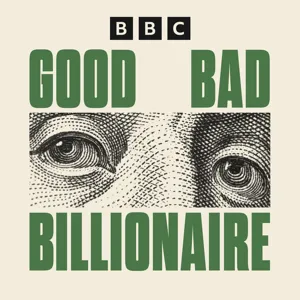Podcast Summary
Seinfeld's Success: Seinfeld's hit sitcom 'Seinfeld' brought him continuous revenue through syndication, sales to streaming platforms, and live stand-up performances, making him the richest comedian in the world. His passion and dedication to comedy led him to success despite industry challenges.
Jerry Seinfeld's success as a billionaire comedian came primarily from his hit sitcom "Seinfeld," which ran from 1989 to 1998 and was watched by an astonishing 76 million people in the US alone. The show's enduring popularity brought in continuous revenue through syndication, sales to streaming platforms, and live stand-up performances. Seinfeld, who grew up in Massapequa, Long Island, with parents who were immigrants and orphans, developed a deep love for comedy from a young age. He idolized comedians and studied their routines, dreaming of a career in advertising or creating comedy content. Despite the challenges of breaking into the entertainment industry, Seinfeld's passion and dedication paid off, leading him to become the richest comedian in the world.
Seinfeld's media opportunities: Seinfeld's determination, experimentation with meditation, and relatable jokes led him to media opportunities, including a Tonight Show appearance, which boosted his career.
Jerry Seinfeld's success in comedy was not only due to his unique comedic voice and observational humor but also the opportunities he seized in the evolving media landscape. Starting from his high school days, Seinfeld's determination to pursue his passion for comedy led him to experiment with transcendental meditation, which he believes helped him gain focus and energy. After college, he began his stand-up career in the mid-1970s, performing in small venues and honing his craft. Seinfeld's apolitical and relatable jokes, which focused on everyday experiences, resonated with a broad audience, and he gained recognition from industry veterans like Jackie Mason and George Shapiro. Despite setbacks like his unsuccessful stint on Benson, Seinfeld persisted, eventually landing a gig on The Tonight Show with Johnny Carson in 1981, which catapulted his career. Throughout his journey, Seinfeld's love for comedy and dedication to his craft played a crucial role in his eventual success.
Opportunities and Influential Individuals: Opportunities and influential individuals can significantly impact one's career, as illustrated by Jerry Seinfeld's breakthrough on The Tonight Show and the role of Rick Ludwig in commissioning additional episodes of Seinfeld
The OK sign from Johnny Carson on The Tonight Show was a pivotal moment in Jerry Seinfeld's career, marking a significant breakthrough for him as a comedian. The nerves of performing in front of a massive audience, despite having already built a successful career, illustrate the pressure and importance of such opportunities. Seinfeld's father's death served as a catalyst for him to work harder and focus on his sitcom aspirations, leading to the creation of Seinfeld with Larry David. A crucial turning point came when a TV executive, Rick Ludwig, saw potential in the show and commissioned additional episodes, ultimately leading to its success. This story highlights the significance of key opportunities and the role of influential individuals in shaping an individual's career.
Seinfeld's focus on comedy: Jerry Seinfeld's focus on making Seinfeld a funny show, without character development or learning, led to its enduring popularity and massive success.
Jerry Seinfeld's success as a millionaire actor transformed into a billionaire businessman was largely due to the enduring popularity of his hit sitcom, Seinfeld. Seinfeld went from being a modest success to a top-rated show, which in turn led to increased advertising revenue and higher fees for Seinfeld. Jerry and Larry David's focus on making the show funny above all else, without character development or learning, resonated with audiences and turned Seinfeld into a global phenomenon. Despite offers for more seasons and lucrative salaries, Seinfeld chose to end the show on his terms, leaving a lasting impact on television history.
Seinfeld's post-Seinfeld career: Jerry Seinfeld's lucrative career post-Seinfeld includes stand-up comedy, animation, reality TV, and advertising, with a net worth of $465 million primarily from syndication deals.
Jerry Seinfeld's post-Seinfeld career has been as successful and lucrative as his time on the iconic sitcom. After a brief stint playing pool and returning to stand-up comedy, Jerry married Jessica Sklar and they had three children. He continues to sell out arena shows worldwide and has ventured into various projects like animation, reality TV, and advertising. His wealth primarily comes from the syndication deals of Seinfeld, which earned him an estimated $465 million up to 2024, and the sale to streaming platforms like Hulu and Netflix. Despite being an "entry-level billionaire," Seinfeld's self-made success without industry connections earns him a high rating.
Jerry Seinfeld's impact: Jerry Seinfeld's impact on the world is mostly positive, with moderate scores for philanthropy and legacy, and low scores for villainy and power.
Jerry Seinfeld, despite some controversies and ethical questions regarding past relationships and comedy commentaries, is generally considered to have a low impact on villainy and power due to his influence mainly being limited to the comedy world. However, he scores relatively well in philanthropy, with his wife and him having set up organizations to help stop family poverty and improve children's education. Additionally, Jerry's influence on comedy and modern television, as seen in shows like "Seinfeld Effect," earns him a considerable legacy score. Overall, Jerry Seinfeld's impact on the world is mostly positive, and his scores for villainy and power are low, while philanthropy and legacy are moderate.
Seinfeld's repetition of mistakes: Seinfeld's humor lies in the characters' lack of learning and their repeated mistakes, contributing to the show's groundbreaking success and influence on comedy.
Seinfeld, a groundbreaking sitcom, is known for its characters' lack of learning and their repetition of mistakes, which adds to the humor. Additionally, its unique structure with multiple interconnected storylines was innovative at the time and influenced comedy significantly. Jerry Seinfeld, the show's creator and star, is considered a good billionaire for making people laugh, although his influence extends beyond comedy is debatable. In the next episode, the podcast will explore the life and legacy of billionaire financier and philanthropist George Soros.
